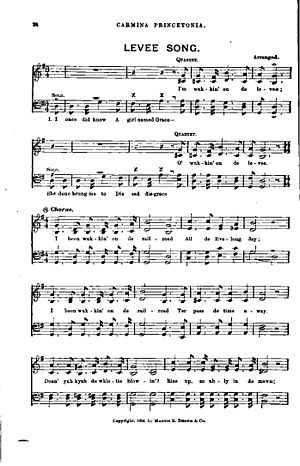I've Been Working on the Railroad facts for kids
Quick facts for kids "I've Been Working on the Railroad" |
|
|---|---|

"I've Been Working on the Railroad", published as Levee Song in the Princeton University compilation Carmina Princetonia, 1898
|
|
| Song | |
| Published | 1894 |
| Songwriter(s) | Anonymous |
"I've Been Working on the Railroad" is a very famous American folk song. Many people know its catchy tune and simple words. It's a song often sung by children and adults alike. This song tells a story about working on the railroad and features a character named Dinah.
The very first time this song was printed was in 1894. It appeared in a book called Carmina Princetonia. This book was a collection of songs from Princeton University. The song was first published under the name "Levee Song". The oldest known recording of the song was made much later, in 1927. It was recorded by a group called the Sandhills Sixteen and released by Victor Records.
Contents
Song's Tune and Inspiration
The melody of "I've Been Working on the Railroad" is quite memorable. The first part of the song's tune might have been inspired by an older piece of music. It sounds very similar to a part of Franz von Suppé's 1846 Poet and Peasant overture. An overture is like an introduction piece of music, often played before an opera or play begins. In this case, a cello solo in the overt has a tune that matches the beginning of "I've Been Working on the Railroad."
Understanding the Lyrics
The words to "I've Been Working on the Railroad" are simple and easy to remember. They describe someone working hard all day on the railroad tracks. The song also mentions a whistle blowing and a captain shouting for Dinah. Dinah is asked to "blow your horn," which could mean a train horn or another signal.
Modern Song Verses
Here are the words that most people sing today:
- I've been working on the railroad
- All the live-long day.
- I've been working on the railroad
- Just to pass the time away.
- Can't you hear the whistle blowing,
- Rise up so early in the morn;
- Can't you hear the captain shouting,
- "Dinah, blow your horn!"
- Dinah, won't you blow,
- Dinah, won't you blow,
- Dinah, won't you blow your horn?
- Dinah, won't you blow,
- Dinah, won't you blow,
- Dinah, won't you blow your horn?
- Someone's in the kitchen with Dinah
- Someone's in the kitchen I know
- Someone's in the kitchen with Dinah
- Strummin' on the old banjo!
- Singin' fee, fie, fiddly-i-o
- Fee, fie, fiddly-i-o-o-o-o
- Fee, fie, fiddly-i-o
- Strummin' on the old banjo.
Older Versions of the Song
The 1894 version of the song, called "Levee Song," had some different words. It included an introduction that is not sung anymore. The second verse was also very different from what we sing today. Some of the language used in older versions of songs, like this one, might sound strange or even inappropriate to us now. This is because language and what is considered polite or respectful change over time. The original lyrics included words and phrases that are not used today because they are not kind or respectful.
 | Georgia Louise Harris Brown |
 | Julian Abele |
 | Norma Merrick Sklarek |
 | William Sidney Pittman |

